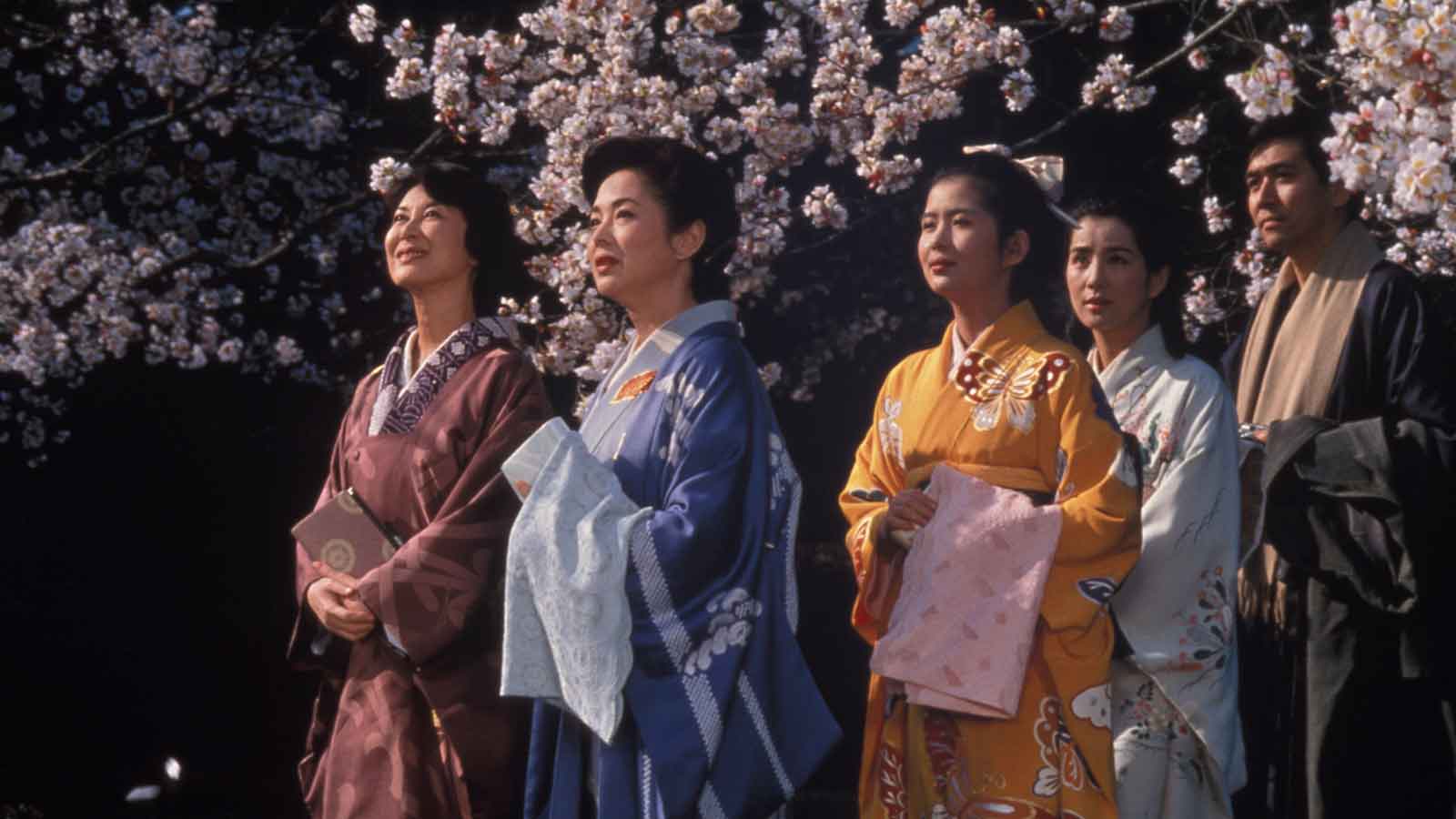The Makioka Sisters
Tuesday, February 6
6 PM, Ayres 106
Free and open to the public

(Japan, 1983) 140 minutes. Directed by Kon Ichikawa.
Introduced by Dr. William Nitzky (Anthropology).
Directed by famous Japanese filmmaker Kon Ichikawa (Fires on the Plain; The Burmese Harp), The Makioka Sisters is a gorgeous filmic adaptation of Junichiro Tanizaki’s 1938 novel of the same name. The film follows the lives and loves of four sisters from the Makioka family, whose wealth is derived from the family’s kimono business; the film is structured on the changing of the seasons and depicts the complex cultural changes in a Japan that finds itself on the cusp of World War II.
This film screening is also in support of the new current exhibition(opens in new window) at the Valene L. Smith Museum of Anthropology titled “Unfolded: Seasons & Symbols of the Kimono,” which we encourage you to also check out!
Watch the The Makioka Sisters trailer(opens in new window)
This film would be of particular interest to those working in and studying Japanese cinema and culture, arthouse cinema, film adaptation, gender studies, textiles and the kimono, and Asian studies.
Be sociable and share with your colleagues, students, staff, campus clubs and organizations, and members of the community who might be interested!
The University Film Series is sponsored by the CSU, Chico Humanities Center.
5 Broken Cameras
Tuesday, February 27
6 PM, Ayres 106
Free and open to the public

(Palestine-Israeli co-production, 2011) 94 minutes. Directed by Emad Burnat and Guy Davidi
Introduced by Dr. Eran Zelnik (History), with a public discussion to follow.
An award-winning documentary (2012 Sundance; 2012 Jerusalem Film Festival; and 2013 International Emmy), 5 Broken Cameras follows five years of life of Palestinian farmer Emad Burnat, a resident of Bil’in, a village in the West Bank. Burnat initially bought his first camera to document the birth of his youngest son in 2005, but he would soon turn his cameras on the conflict between Israel and Palestine. Israeli filmmaker Guy Davidi joined Burnat in 2009, and together they would create a powerful film depicting everyday Palestinian life near the West Bank barrier.
Watch the 5 Broken Cameras trailer(opens in new window)
This film would be of particular interest to those working in and studying Israeli and Palestinian history and conflict, documentary films, Middle East studies, sociology, anthropology, political science and political cinema, and international relations.
Be sociable and share with your colleagues, students, staff, campus clubs/organizations, and members of the community who might be interested!
The Last Wave
Tuesday, April 9
6 PM, Ayres 106

(Australia, 1977) 106 minutes. Directed by Peter Weir.
Introduced by Dr. Nathaniel Heggins Bryant (English).
A landmark film in the Australian New Wave film movement, The Last Wave is a supernatural thriller and follow-up to famed director Peter Weir’s 1975 Picnic at Hanging Rock. The Last Wave follows the increasingly disturbing encounters and apocalyptic visions of a white lawyer tasked with representing four Australian Aboriginal men accused of murder. Featuring famous Australian Aboriginal actor David Gulpilil (of the Mandjalpingu clan), the film delves deeply into the tensions between white settler society and Aboriginal beliefs in 1970s Australia.
Watch the The Last Wave trailer(opens in new window)
This film would be of particular interest to those working in and studying arthouse and independent cinema, Australian cinema and history, indigenous studies, Australian Aboriginal culture and story, sociology, anthropology, white settler colonialism, legal drama, environmental criticism, apocalypse narratives, and international relations.
Be sociable and share with your colleagues, students, staff, campus clubs/organizations, and members of the community who might be interested!
The University Film Series is sponsored by the CSU, Chico Humanities Center.
Le Fleuve/The River
Tuesday, November 14th
6 PM, PAC 134
This film is FREE and open to the public.

99 minutes. Directed by Jean Renoir (France/India/United States, 1951) Introduced by Dr. Erin K. Kelly (English).
An international production and helmed by famous French auteur Jean Renoir, the 1951 film La Fleuve/The River is a coming-of-age story set entirely in India, with the title river serving as an emotional backdrop and counterpoint to the very human drama unfolding on its banks. Shot in beautiful Technicolor, The River won the International Award at the prestigious Venice Film Festival in 1951, and film luminaries including Martin Scorsese and Wes Anderson cite it as a personal favorite; indeed, The River had a profound influence on Anderson's 2007 family-comedy The Darjeeling Limited.
This film would be of particular interest to those working in arthouse and independent cinema; French cinema; filmic depictions of India; colonialism; and romance.
Be sociable and share with your colleagues, students, staff, campus clubs/organizations, and members of the community who might be interested!
FREE and open to the public!
Ponyo
Tuesday, September 19th
6 PM, PAC 134
This film is FREE and open to students, faculty, and staff only.

(Japan, 2008) 101 minutes. Written and directed by Hayao Miyazaki. Introduced by Dr. Nathaniel Heggins Bryant (English).
Calling all Studio Ghibli fans! Playing at the edge of the sea, five-year-old Sōsuke comes across a small goldfish trapped in a glass jar. Unbeknownst to him, this goldfish is Brunhilde, who prefers to be called Ponyo, the headstrong daughter of a powerful magician named Fujimoto who lives under the ocean and who resents land-dwelling humans continually polluting and overfishing his realm. Drama and magic ensues in this animated feature, the eighth film Hayao Miyazaki directed for Japan's most famous animation studio, Studio Ghibli. Ponyo quickly became the fifth-highest grossing anime ever and still sits in the top-ten. Roger Ebert gave the film four stars out of four, declaring "There is a word to describe Ponyo, and that word is magical. This poetic, visually breathtaking work by the greatest of all animators has such deep charm that adults and children will both be touched. It's wonderufl and never even seems to try: It unfolds fantastically."
This film would be of particular interest to those working in Japanese anime and manga; animation; and environmentalism and critical ocean studies.
Be sociable and share with your colleagues, students, staff, campus clubs, and organizations who might be interested - the screening is free!
FREE and open to students, faculty, and staff only.



